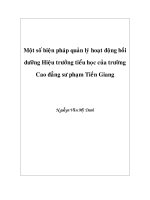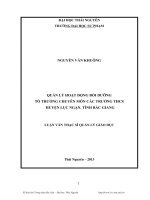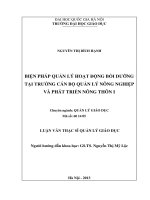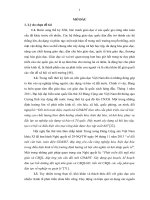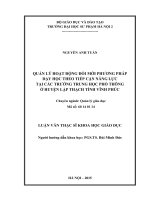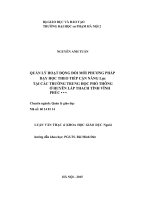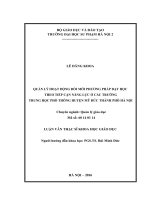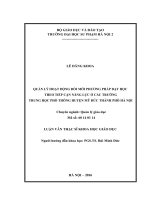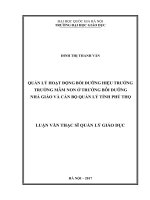Quản lý hoạt động bồi dưỡng hiệu trưởng trường THCS theo tiếp cận năng lực tt tiếng anh
Bạn đang xem bản rút gọn của tài liệu. Xem và tải ngay bản đầy đủ của tài liệu tại đây (370.81 KB, 28 trang )
MINISTRY OF EDUCATION AND TRAINING
VINH UNIVERSITY
NGO XUAN DONG
MANAGING THE TRAINING ACTIVITIES
OF SECONDARY SCHOOL PRINCIPALS IN
ACCORDANCE WITH THE ABILITY APPROACH
Specialization: Education Management
Code: 9140114
SUMMARY OF THE DOCTORAL THESIS IN EDUCATION SCIENCE
NGHE AN-2019
1
INTRODUCTION
1. The necessity of the subject
In recent years, the contingent of teachers and education managers of our
country has developed in both quantity and quality, with more and more reasonable
structures. However, with the requirements of the basic and comprehensive
innovation of education and training, these staffs are still inadequate in quality,
quantity and structure; some of which have not kept up with the requirements of
innovation and education development. Therefore, along with the training innovation,
it is necessary to innovate the training of teachers and education managers, including
principals of secondary schools.
In schools in general, and in secondary schools in particular, principals have a
particularly important role, which is considered as the engine to ignite the machine
and move on. In response to the current requirements of education innovation,
principals of secondary schools must have the necessary abilities. Therefore, the
training of secondary school principals in the current context must focus on forming
the necessary abilities; In other words, the training of secondary school principals in
the current context needs to be implemented in accordance with the ability approach.
Currently, the training of education managers in general and secondary school
principals in particular is mainly in accordance with the content approach, so the
results are still very limited, which especially has not formed the necessary abilities
for secondary school principals in order to meet the requirements of education and
training innovation. Besides, managing the training activities of secondary school
principals has inadequacies in planning, organizing, directing and evaluating.
For the above reasons, the subject of "Managing the training activities of
secondary school principals in accordance with the ability approach" has been
selected for the doctoral thesis specializing in Education Management.
2. Research objectives
On the basis of theoretical and practical research on the training of secondary
school principals in educational institutions, the thesis proposes some solutions to
improve the efficiency of managing the training activities of secondary school
principals in accordance with the ability approach.
3. Object and subject of research
3.1. Object of research
The training activities of secondary school principals in accordance with the
ability approach.
2
3.2. Subject of research
The managing the training activities of secondary school principals in
accordance with the ability approach.
4. Hypothesis
If we can propose and implement scientific and feasible solutions based on the
characteristics of the managing labor and the ability framework of secondary school
principals, it is possible to improve the efficiency of managing the training activities
of secondary school principals in accordance with the ability approach.
5. Research duties
5.1. Studying the literature reviews of managing the training activities of
secondary school principals in accordance with the ability approach.
5.2. Surveying the situation of managing the training activities of secondary
school principals in accordance with the ability approach.
5.3. Proposing some solutions to the managing the training activities of
secondary school principals in accordance with the ability approach.
5.4. Evaluating the efficiency of the proposed solutions by means of
experimenting.
6. Scope of research
Surveying the situation and experimenting a number of solutions of managing
the training activities of secondary school principals in accordance with the ability
approach in Ho Chi Minh City in the academic year of 2015-2016, 2016-2017 and
2017-2018.
7. Methodology and research methods
7.1. Methodology
The thesis uses the following approaches such as the system-structure
approach; the activity approach; the ability development approach and the human
resource management approach.
7.2. Research Methods
7.2.1. Group of theoretical research methods
This method group aims at gathering theoretical information to build the
theoretical basis of the subject.
7.2.2. Group of practical research methods
This group of methods aims at collecting practical information to build the
practical basis of the topic subject
7.2.3. Group of Mathematical statistical methods
3
This group of methods aims at using statistical formulas to process the
collected data, compare and give the research results of the thesis.
8. Defense points
8.1. The training of secondary school principals in accordance with the ability
approach is the process of making these staffs have the qualities and abilities of
managers to meet the requirements of the basic and comprehensive education and
training innovation.
8.2. The training and the managing the training activities of secondary school
principals have primarily focused on the content; not much on forming and
developing the necessary abilities of secondary school principals on professional
skills, pedagogical expertise and school management skills.
8.3. In order to improve the efficiency of managing the training activities of
secondary school principals in accordance with the ability approach, it is necessary to
synchronously implement the solutions from raising the awareness to in-school
training together with self-study and self-training, Meantime, it is important to
renovate the contents, the forms and the methods of the training programs
9. New contributions of the thesis
9.1. Formulating a theoretical framework of managing the training activities of
secondary school principals in accordance with the ability approach.
9.2. Objectively assessing the situation of the training and the managing the
training activities of secondary school principals in accordance with the ability
approach in Ho Chi Minh City.
9.3. The proposed solutions help education manager educating and training
institutions to develop programs and operate the training of secondary school
principals in particular and education managers in general.
10. Structure of the thesis
In addition to the introduction, the conclusion and recommendations, the thesis
is structured into 3 chapters:
Chapter 1: The literature reviews of managing the training activities of
secondary school principals.
Chapter 2: The situation of managing the training activities of secondary
school principals in accordance with the ability approach in Ho Chi Minh city.
Chapter 3: The solutions to the managing the training activities of the secondary
school principals in accordance with the ability approach in Ho Chi Minh City.
4
Chapter 1
THE LITERARURE REVIEWS OF MANAGING THE TRAINING
ACTIVITIES OF SECONDARY SCHOOL PRINCIPALS.
1.1. OVERVIEWS
1.1.1. International research
In some countries around the world, many authors have studied the issues on
training education managers, training education managers in accordance with the
ability approach and managing the training activities of education managers in
accordance with the ability approach. These are the studies by such authors as Davis
S. Darling D, Hammond L., LaPointe M., Mayerson D., Boyatzis et al. and Whetten
& Cameron ...
1.1.2. Domestic research
In Vietnam, the studies have focused on the following issues: the necessity to
train education managers in general, and school principals in particular; the
objectives, the requirements, the contents, the methods, the forms of training school
principals and the managing the training activities of school principals in accordance
with the ability approach. These are the works by the authors such as Dang Quoc
Bao, Tran Ba Hoanh, Bui Minh Hien, Dang Ba Lam, Mac Van Trang, Dang Thanh
Hung, Pham Do Nhat Tien, Nguyen Cong Giap ....
1.2. BASIC CONCEPTS OF THE SUBJECT
1.2.1. Principals and secondary school principals
1.2.1.1. Principals
Principals are the ones who are responsible for managing schools’ activities
and are appointed and recognized by an authorized state agency.
1.2.1.2. Secondary school principals
Secondary school principals are the ones who are responsible for managing
secondary schools’ activities and are appointed and recognized by the Heads of
Education and Training Departments.
1.2.2. Training and training activities
1.2.2.1. Training
Training is the process of improving professional qualifications, knowledge
and professional skills on a regular basis. It is a process of ability improving on the
basis of trained skills and knowledge.
5
1.2.2.2. Training activities
Training activities are the activities of changing and updating the knowledge
that is deficient or outdated, supplementing the professional expertise, further training
or strengthening professional skills according to the thematic topics.
1.2.3. Ability and ability approach
1.2.3.1. Ability
Ability is a combination of the three components: knowledge, skills and
professional attitudes that an individual needs to possess in order to fulfill the
missions and the tasks of a standardized profession in certain conditions.
1.2.3.2. Ability approach
Ability approach is an output approach, stating the outcome - the abilities or
skills that learners want to achieve at the end of each learning period in a particular
subject.
1.2.4. Managing and managing the training activities of secondary school
principals in accordance with the ability approach.
1.2.4.1. Managing
Managing is the process of directional impacts of managers on managees in
order to create the cooperation of the members in an organization to effectively use
the potentials in order to achieve the set objectives. .
1.2.4.2. Managing the training activities of secondary school principals in
accordance with the ability approach
The managing of the training activities of secondary school principals in
accordance with the ability approach is the process of planning, organizing, directing
and examining the training activities of education manager training institutions to
supplement the knowledge, improve the abilities, the qualifications and the
personalities for secondary school principals.
1.3. SECONDARY SCHOOL PRINCIPALS IN THE CONTEXT OF THE
GENERAL EDUCATION INNOVATION
1.3.1. The context of the education innovation
Along with the innovation of the whole education and training sector, the
general education has been reformed basically and comprehensively in all aspects:
the objectives, the contents, the programs, the methods and the forms of education
and the education management. These innovations have affected the activities of
training secondary school principals in accordance with the ability approach.
6
1.3.2. Roles of secondary school principals in the context of the general
education innovation
Secondary school principals are the ones who lead, manage, implement the
education policies and guidelines in an educational institution. Under the
influence of education innovation, the roles of secondary school principals have
changed substantially.
1.3.3. Functions of secondary school principals in the context of the
general education innovation
1.3.3.1. Functions of secondary school principals
Principals have the functions of leading, managing, coordinating and serving
the community.
1.3.2.2. Duties and powers of secondary school principals
Secondary school principals have the following main duties and powers:
developing and organizing the school system; implementing the resolutions of the
School Council; making plans for school development; establishing the professional
divisions, the office divisions and the advisory councils in schools; managing
teachers and staffs; managing students and students’ activities organized by the
schools; managing school finance and property; implementing the State’s policies
and regulations to teachers, staffs and students; having training to improve the
qualifications and professional skills and getting the benefits according to the policies
and regulations prescribed by law.
1.3.4. The ability framework of secondary school principals in the context
of the general education innovation
The principals’ ability framework includes: the political and ethical qualities,
the lifestyles; the professional and pedagogical ability; the leading and managing
ability; the ability of social relations and public relations; and the ability of career
development and self-development.
1.4. THE TRAINING ACTIVITIES OF SECONDARY SCHOOL
PRINCIPALS IN ACCORDANCE WITH THE ABILITY APPROACH
1.4.1. The importance of the training activities of secondary school
principals in accordance with the ability approach
It is of special importance to train secondary school principals in accordance
with the ability approach. Through the training activities, it is possible to form the
7
necessary personalities and abilities for secondary school principals to meet the
requirements of the general education innovation.
1.4.2. The components of the training activities of secondary school
principals in accordance with the ability approach
The components of the training activities of secondary school principals in
accordance with the ability approach include: the objectives; the programs, the
contents and the training materials; the methods and forms of training; the location
and time of training; the teachers and learners.
1.5. THE MANAGING THE TRAINING ACTIVITIES OF SECONDARY
SCHOOL PRINCIPALS IN ACCORDANCE WITH THE ABILITY APPROACH
1.5.1. The necessity of managing the training activities of secondary school
principals in accordance with the ability approach
To meet the standardized output of the training activities of secondary school
principals, improve the efficiency of the training activities of secondary school
principals in accordance with the ability approach. encourage and develop the
capacity of self-training in accordance with the ability approach of each secondary
school principal, it is necessary to manage the training activities of secondary school
principals in accordance with the ability approach.
1.5.2. The contents of managing the training activities of secondary school
principals in accordance with the ability approach
The contents of managing the training activities of secondary school principals
in accordance with the ability approach include: making plans for training,
establishing the system of human resources to participate in training secondary school
principals in accordance with the ability approach, managing lecturers and the
teaching activities of training secondary school principals in accordance with the
ability approach, directing the reform of the training programs of secondary school
principals in accordance with the ability approach, examining and evaluating
activities of training secondary school principals in accordance with the ability
approach
1.5.3. The subjects to manage the training activities of secondary school
principals in accordance with the ability approach
The subjects to manage the training activities of secondary school principals in
accordance with the ability approach are District People's Committees and Heads of
Education and Training Departments; in which the Heads of Education and Training
8
Departments bear the full responsibility(the direct system) under the direction of the
District People's Committees.
1.6. THE FACTORS AFFECTING THE MANAGING THE TRAINING
ACTIVITIES OF SECONDARY SCHOOL PRINCIPALS IN ACCORDANCE
WITH THE ABILITY APPROACH
1.6.1. The objective factors
The objective factors include: the globalization and international integration;
the social and economic conditions; the concern of the authorities of all levels, the
system of legal documents on the ability standards for secondary school principals;
the management mechanisms and policies of the State and those of the education
sector on organizing the training activities of secondary school principals in
accordance with the ability approach
1.6.2. The subjective factors
The subjective factors include: the prestige and branding of training
institutions; the teaching-learning environment; the qualifications and the needs for
training of learners; the professional qualifications of teachers.
9
Chapter 2
THE CURRENT SITUATION OF MANAGING THE TRAINING ACTIVITIES
OF SECONDARY SCHOOL PRINCIPALS IN HO CHI MINH CITY
2.1. OVERVIEWS OF THE NATURAL, SOCIO-ECONOMIC AND
SECONDARY SCHOOL EDUCATION CONDITIONS IN HO CHI MINH CITY
On the basis of analyzing the natural, socio-economic and secondary school
education conditions of Ho Chi Minh City, the thesis has shown the impacts of these
conditions on the training and managing the training activities of secondary school
principals in the area.
2.2. ORGANIZING THE SURVEY ON THE SITUATION
2.2.1. The objectives to survey the situation
The objectives of the survey is to assess properly and objectively the situation
of the training and the managing the training activities of the secondary school
principals in Ho Chi Minh City.
2.2.2. The objects and the surveying time
Education managers at all levels, lecturers participating in teaching the training
courses, staffs and learners (Principals, Vice Principals of secondary schools)
The surveying time: 3 academic years 2016-2017, 2017-2018, 2018-2019
2.2.3. The contents of surveying the situation
The contents of the survey have focused on the following three main issues: 1)
The current situation of the training activities of secondary school principals in Ho
Chi Minh City; 2) The current situation of the managing the training activities of
secondary school principals in Ho Chi Minh City; 3) The current situation of the
factors affecting the managing the training activities of secondary school principals in
Ho Chi Minh City.
2.2.4. The surveying methods
In the thesis, the surveying methods have been used such as: the investigations
by means of questionnaires, the interviews and statistical methods to process
collected data.
2.3. THE CURRENT SITUATION OF THE TRAINING ACTIVITIES OF
SECONDARY SCHOOL PRINCIPALS IN HO CHI MINH CITY
The thesis has examined the surveyed objects’ awareness of the current
situation of the importance of the training activities of secondary school principals;
10
the current situation of the training programs and the contents of the training
secondary school principals; the current situation of the relevance levels of the forms
and the methods of training secondary school principals; the current situation of the
suitability of the location and the training time ; the current situation of the relevance
of teaching activities of lecturers and learning activities of learners in secondary
school principals training classes.
From the analysis of the situation of the training activities of secondary school
principals in Chi Minh City, the following remarks can be drawn: most of the
surveyed objects have full and precise awareness of the importance of the training
activities of secondary school principals. The programs and contents of training
secondary school principals are mainly inclined to approach the contents, but not the
abilities; The relevance of the location and the training time, the teaching activities of
lecturers and the learning activities of the learners in secondary school principals
training classes has not been high.
2.4. THE CURRENT SITUATION OF THE MANAGING THE TRAINING
ACTIVITIES OF SECONDARY SCHOOL PRINCIPALS IN HO CHI MINH CITY
The thesis has examined the surveyed objects’ awareness of the current situation
of the necessity to manage the training activities of secondary school principals in
accordance with the ability approach; the current situation of making plans for training
secondary school principals in accordance with the ability approach; the current
situation of directing the reform of the training program of secondary school principals
in accordance with the ability approach ; the current situation of managing the system
participating in the training activities of secondary school principals in accordance with
the ability approach ; the situation of managing teachers and learners and the teaching
activities in accordance with the ability approach
From the analysis of the current situation of the training activities of secondary
school principals in accordance with the ability approach in Ho Chi Minh City, the
following comments can be drawn: managers and teachers are fully aware of the
necessity to manage the training activities of secondary school principals in
accordance with the ability approach. According to the ability approach; plans for
training secondary school principals which have been developed by the District
Education and Training departments are not in accordance with the ability approach;
there are limitations in managing the system participating in the training activities of
secondary school principals; the management of teaching and learning activities of
11
lecturers and learners is not methodical; the testing and evaluating the results of the
training of secondary school principals has not based on the ability framework of
secondary school principals.
2.5. THE CURRENT SITUATION OF THE IMPACTS OF THE FACTORS
ON THE TRAINING ACTIVITIES OF SECONDARY SCHOOL PRINCIPALS IN
HO CHI MINH CITY
There are the objective and subjective factors affecting the training activities of
secondary school principals, in which the subjective factors are evaluated by the
surveyed objects to be more influential.
2.6. THE GENERAL EVALUATION OF THE SITUATION
2.6.1. Strengths
Education managers in secondary schools have full and precise awareness of
the importance of the training activities of secondary school principals; the authorities
at all levels have clearly seen the necessity to manage the training activities of
secondary school principals in accordance with the ability approach; In Ho Chi Minh
City, a number of training activities and managing the training activities of secondary
school principals in accordance with the ability approach have initially been
implemented.
2.6.2. Drawbacks
The contents, the programs, the methods, the forms, the testing and evaluating
the results of the training activities and the managing the training activities of
secondary school principal have not yet been renewed according to the ability
approach;
2.6.3. Reasons
The process of developing plans for training secondary school principals in
accordance with the ability approach has not yet improved; There are no specialized
divisions in charge of training secondary school principals in accordance with the
ability approach; the contents, the programs, the methods and forms of training
secondary school principals have not been improved according to the ability
approach; A set of standards has not yet been developed as the basis to objectively
evaluate the training activities of secondary school principals in accordance with the
ability approach; A system of conditions for effective management of the training
activities of secondary school principals in accordance with the ability approach has
not yet been set up.
12
Chapter 3
SOLUTIONS FOR MANAGING THE TRAINING ACTIVITIES
OF SECONDARY SCHOOL PRINCIPALS IN ACCORDANCE WITH
THE ABILITY APPROACH
3.1. PRINCIPLES TO PROPOSE THE SOLUTIONS
The proposing of solutions is based on the following principles: ensuring the
objective feature; ensuring the systematic feature; ensuring practical feature; and
ensuring the efficient and feasible features.
3.2. SOLUTIONS FOR MANAGING THE TRAINING ACTIVIES OF
SECONDARY SCHOOL PRINCIPALS IN ACCORDANCE WITH THE ABILITY
APPROACH
3.2.1. Renovating the process of developing plans for training secondary
school principals in accordance with the ability approach
3.2.1.1. The objective of the solution
The objective of the solutions is to propose the process of developing plans for
training secondary school principals in accordance with a new approach which is the
ability approach.
3.2.1.2. The content of the solution
The plans for training secondary school principals must clearly define the
general abilities and the specific ones which secondary school principal need to train.
It is this requirement that requires the reform of the process of developing plans for
training secondary school principals.
3.2.1.3. How to implement the solution
Point out the limitations and shortcomings of the process of developing plans
for training secondary school principals in the past
Develop plans for training secondary school principals in accordance with the
ability approach
Regularly review and improve the process of developing plans for training
secondary school principals in accordance with the ability approach
3.2.1.4. The conditions for implementing the solution
Subjects of managing the training activities need to have skills to develop plans
for training secondary school principals. Educational institutions and localities must
have qualified resources to implement plans for training secondary school principals
in accordance with the ability approach
13
3.2.2. Organizing specialized divisions in charge of training secondary
school principals in accordance with the ability approach
3.2.2.1. The objective of the solution
The objective of the solution is to propose ways to efficiently organize
specialized divisions in charge of training secondary school principals in accordance
with the ability approach.
3.2.2.2. The content of the solution
The Departments of Education and Training need to set up specialized
divisions. These divisions includes: Heads of the departments, specialists in charge of
education and finance whom are directly led by the Heads. Participants in specialized
divisions in charge of training secondary school principals in accordance with the
ability approach (as collaborators) can be lecturers of the training courses.
3.2.2.3. How to implement the solution
Develop the operational regulations of the specialized divisions in charge of
training secondary school principals in accordance with the ability approach
Specify the operational contents of the specialized divisions in charge of
training secondary school principals in accordance with the ability approach
Improve the abilities of the members of specialized divisions in charge of
training secondary school principals in accordance with the ability approach
3.2.2.4. The conditions for implementing the solution
There must be complete agreement from the managers to the implementing
staffs; There must be the insurance of adequate legal bases, facilities and human
resources;
Participants in specialized divisions in charge of training secondary school
principals in accordance with the ability approach must have the necessary abilities
and personalities.
3.2.3. Improving the contents and the programs of training secondary
school principals in accordance with the ability approach
3.2.3.1. The objective of the solution
The objective of the solution is to propose ways to improve the contents and
programs of training secondary school principals in accordance with the ability
approach
3.2.3.2. The content of the solution
Determine the contents of the training programs according to the social needs
and those of the learners such as the strategy developing, the human resource
14
management, the financial management, the system of information of education
management, the evaluation in education.
On the basis of reviewing the general education program, it is important to
identify the problems for the principals when managing education according to the
new program. The training of secondary school principals in accordance with the
ability approach needs to meet the requirements of the new program.
3.2.3.3. How to implement the solution
Analyze the current program of training secondary school principals
Propose a program to train secondary school principals in accordance with the
ability approach
3.2.3.4. The conditions of implementation
Managers must have the skills to develop the program of training secondary
school principals in accordance with the ability approach
There must be resources (human resources, material resources, and financial
resources) for developing the program of training secondary school principals in
accordance with the ability approach
3.2.4. Renovating the methods and forms of training secondary school
principals in accordance with the ability approach
3.2.4.1. The objective of the solution
The objective of the solution is to provide the methods and forms of training
secondary school principals in accordance with the ability approach in the most
effective ways.
3.2.4.2. The content of the solution
The methods and forms play an important role in training secondary school
principals in accordance with the ability approach. Renovating the forms of training
needs flexibility in using the training forms that are suitable for the ability approach,
in personalizing the learning process, in focusing on the outputs and in choosing
appropriate ways to test and evaluate learners.
3.2.4.3. How to implement the solution
Select the methods and forms of training secondary school principals in
accordance with the ability approach to meet the ability development requirements
Implement the use of the methods and forms of training secondary school
principals in accordance with the ability approach to meet the ability development
requirements in a certain process
15
3.2.4.4. The conditions of implementation
Lecturers in charge of teaching /training secondary school principals must have
knowledge and skills in order to apply positive training methods and forms.
Secondary school principals (objects of training) must have high selfawareness and self-study and self-train abilities.
3.2.5. Developing a set of standards as the basis to objectively evaluate the
training activities of secondary school principals in accordance with the ability
approach
3.2.5.1. The objective of the solution
The objective of the solution is to develop a set of standards as the basis to
objectively evaluate the training activities of secondary school principals in
accordance with the ability approach.
3.2.5.2. The content of the solution
However, in order to objectively evaluate the training activities of secondary
school principals in accordance with the ability approach, it is necessary to develop a
set of standards and use it in evaluating the results of training secondary school
principals in accordance with the ability approach.
3.2.5.3. How to implement the solution
Develop a set of standards for evaluating the training activities of secondary
school principals in accordance with the ability approach.
Organize the evaluation of the results of training secondary school principals
according to the set of standards.
Improve the set of standards for evaluating the training activities of secondary
school principals in accordance with the ability approach.
3.2.5.4. The conditions for implementing the solution
The subjects to manage the training activities of secondary school principals in
accordance with the ability approach must have knowledge and skills to develop and
use the set of standards to evaluate the results of training secondary school principals
in accordance with the ability approach.
There must be resources to serve the evaluation of the results of training
secondary school principals according to the developed set of standard.
3.2.6. Organizing a system of conditions to effectively manage the activities
of training secondary school principals in accordance with the ability approach
3.2.6.1. The objective of the solution
The objective of the solution is to propose ways to organize a system of
16
conditions to effectively manage the training activities of secondary school principals
in accordance with the ability approach
3.2.6.2. The content to implement the solution
The conditions for the effective management of the training activities of
secondary school principals in accordance with the ability approach are essentially
the resources, from the human resources, the facility resources to the financial
resources.
3.2.6.3. How to implement the solution
Develop the ability to manage the training activities of secondary school
principals in accordance with the ability approach for those with responsibilities
Develop school facilities and teaching equipment in synchronous and modern
ways
Promote the application of Informatics Technology in the training activities of
secondary school principals in accordance with the ability approach.
3.2.6.3. The conditions for implementing the solution.
There are the human resources that meet the requirements of the managing the
training activities of secondary school principals in accordance with the ability
approach.
There are the facilities and the financial resources to meet the requirements of
the managing the training activities of secondary school principals in accordance with
the ability approach.
3.3. THE SURVEY ON THE NECESSITY AND FEASIBILITY OF THE
PROPOSED SOLUTIONS
3.3.1. The objective of the survey
The objective of the survey is to collect the information to evaluate the
necessity and feasibility of the proposed solutions, based on which the inappropriate
solutions will be adjusted and the reliability of the highly appreciated solutions will
be confirmed.
3.3.2. The content and the methods of the survey
3.3.2.1. The content of the survey
The content of the survey concentrates on the two issues:
The first issue: Whether or not are the proposed solutions really necessary for
the managing the training activities of secondary school principals in accordance with
the ability approach?
17
The second issue: Whether or not are the proposed solutions really feasible for
the managing the training activities of secondary school principals in accordance with
the ability approach in the current conditions?
3.3.2.2. The method of the survey and the evaluating scale
Exchanging the information by means of the questionnaires with the evaluating levels
+) Very necessary, necessary, not necessary
+) Very feasible, feasible, not feasible,
3.3.3. Surveyed objects
Education managers and specialists of the Education and Training Service and
the Education and Training Department, principals of some secondary schools in the
district and a number of lecturers participating in teaching the training courses.
3.3.4. Survey results on the necessity and feasibility of the proposed
solutions
The results of the survey show that the participants highly appreciate the
necessity and the feasibility of solutions. More than 97% of the participants evaluate the
solutions as very necessary and necessary as well as very feasible and feasible. Moreover,
the necessity and feasibility of the solutions are closely related to each other
3.4. EXPERIMENTING THE SOLUTION MANAGING THE TRAINING
ACTIVIES OF SECONDARY SCHOOL PRINCIPALS IN ACCORDANCE WITH
THE ABILITY APPROACH”
3.4.1. The overview of the experiment
3.4.1.1. The objective of the experiment
The objective is to identify the efficiency, the feasibility and the necessary
conditions to implement two of the proposed solutions
3.4.1.2. The hypothesis of the experiment
It is possible to improve knowledge and skills for secondary school principals,
contribute to the efficiency of school management if the solutions “Improving the
contents and the programs of training secondary school principals in accordance with
the ability approach” and “Renovating the methods and forms of training secondary
school principals in accordance with the ability approach” are applied.
3.4.1.3. The content and the method of the survey
i) The content of the survey
Because of the timing condition, we have decided to organize the experiment
on the two solutions “Improving the contents and the programs of training secondary
18
school principals in accordance with the ability approach” and “Renovating the
methods and forms of training secondary school principals in accordance with the
ability approach” because they are closely related to each other.
ii) The way to carry out the experiment
The experiment is done once with the same group of subjects in accordance
with the following model
Pre- impact evaluation
Solutions or Impacts
Post- impact evaluation
O1
X
O2
The results are measured by comparing the difference between the post-impact
(TN) results and the pre-impact results ( the input).
When there is a difference (expressed through | O2-O1 |> 0), we can draw the
conclusion that the two selected solutions for experimenting have improved the
school management ability for secondary school principals.
3.4.1.4. The standard and the evaluating scale of the experiment
Experimental results are evaluated based on the two criteria: knowledge and
skills of school management of secondary school principals.
3.4.1.5. The location, the time and the sample of objects of the experiment
i) The location of the experiment
At School of Education Training of District 7, Ho Chi Minh City.
ii) The time
From May 2018 to July 2018.
iii) The sample of objects
The experimental sample is a the training class for secondary school principals
at School of Education Training of District 7, Ho Chi Minh City.
3.4.1.6. Processing the experiment results
We use the following parameters to process the collected data: the arithmetic
mean, the variance, the standard deviation, the coefficient of variation ...
3.4.2. Analysis of the experiment results
3.4.2.1. Analysis of the input results
We have surveyed the input level of the knowledge and the skills of the
experimental objects. Based on the analysis of the survey results, we can come to the
conclusion that the initial level of the knowledge and the skills of the experimental
objects is still low. In order to improve the efficiency of school management, they
need to be fully trained on the knowledge and skills.
19
3.4.2.2. Analysis of the results of the quantitative experiment
i) The results on the knowledge level of the objects after the experiment
Table 3.8. Table of the frequency of distribution F for the number
of the objects who get Xi after the experiment
Scores
Quantity
45
___
3
4
5
6
7
8
9
10
X
0
1
6
8
8
9
8
5
7.38
Combining the results of Table 3.6 and Table 3.8, we have set up Table 3.9.
Table 3.9. Table of the frequency of the input results
and post-experimenting resultson the knowledge of the objects
The number of
Quantity
measurement
Preexperimenting
Experimenting
Quantity Parameters
Standard
Variance
deviation
___
X
Coefficient
variability
45
6.24
3.78
1,94
31,08
45
7.38
2.73
1.65
22,35
From the results in Table 3.9, it is possible to set the table of the frequency of
distribution f i , the table of the frequency of accumulation f i and draw the
diagrams of the frequency of accumulation f i and the charts of the frequency of
distribution f i .
Table 3.10. The frequency of distribution f i and the frequency
of accumulation f i on the knowledge of the experimental
objects before and after the experiment
Xi
3
4
5
6
7
8
9
10
Pre experimenting (n = 45)
fi
fi
Fi
2
4,44
100
7
15,55
95,56
8
17,77
80,01
11
24,44
62,24
4
8,88
37,80
6
13,33
28,92
5
11,11
15,59
2
4,44
4,44
45
100
Post experimenting(n = 45)
fi
fi
Fi
0
1
2,22
100
6
13,33
97,78
8
17,77
84,45
8
17,77
66,68
9
20,00
48,91
8
17,77
28,91
5
11,11
11,11
277
45
20
Figure 3.4. The diagram of the frequency of distribution f i on the knowledge
of the experimental objects before and after the experiment
Figure 3.5. The diagram of the frequency of accumulation f i on the
knowledge of the experimental objects before and after the experiment
From the above results, the following comments can be drawn:
+) The average score of the experiment is higher than the average score of the
pre- experimenting: 7.38> 6.24;
21
+) The coefficient of variation of the experiment is smaller than the coefficient
of variation of the pre- experimenting: 22.35 <31.08;
+) The diadrams representing the frequency and the frequency of accumulation
after the experiment are higher and move to further right compared to the frequency
and frequency of accumulation before the experiment.
With the above results, it can be seen that the knowledge level of the
experimental objects after the experiment is higher than that before the experiment.
ii) The results on skills of the experimental objects after the experiment.
The results after experiments on skills of experiment subjects are shown in
Table 3.11.
Table 3.11. The results on skills of the objects after the experiment
No
1
2
3
4
5
6
7
8
9
10
Skills
skill of organizing plans for school
development
skills of managing activities of teaching
and educating students
skills of managing human resources,
organizing and administrating
skills of managing finance, facilities,
equipment and technology in teaching
and educating students
skills of education quality management in
schools
skills of building school culture and
implementing democracy in schools
skills of building safe schools and
preventing school violence
skill of coordinating between schools,
families and society to implement
teaching and educational activities for
students
skills of coordinating between schools,
families and society in mobilizing and
using resources for school development
skills of using foreign languages (English
is the priority) and applying information
technology in school administration
___
X
Good
%
33,33
(15)
35,55
(16)
35,55
(16)
Rate %
Average Not good
%
%
55,55
11,11
(25)
(5)
53,33
11,11
(24)
(5)
55,55
8,88
(25)
(4)
33,33
(15)
53,33
(24)
13,33
(6)
35,55
(16)
35,55
(16)
35,55
(16)
53,33
(24)
51,11
(23)
53,33
(24)
11,11
(5)
13,33
(6)
11,11
(5)
33,33
(15)
55,55
(25)
11,11
(5)
35,55
(16)
53,33
(24)
11,11
(5)
31,11
(14)
55,55
(25)
13,33
(6)
34,50
53,00
12.40
22
Table 3.11 shows that the results on skills of the experimental subjects are
higher than those before the experiment. These are the details:
+) The number of people classified as good after the experiment is higher than
that before the experiment (34.5% compared with 22.70%).
+) The number of people ranked at not good after the experiment is smaller
than that before the experiment (12.40% compared with 22.60%).
In order to have a clear view of the results on skills of the experimental objects
before the experiment and after the experiment, we use the following chart:
Chart 3.6. The comparison of the results on skills of the experimental objects
before the experiment and after the experiment
3.4.2.3. Analysis of the results of the qualitative experiment
Through the practical research at some secondary schools in District 7, Ho Chi
Minh City, we have the following general assessments:
- The training has contributed to improving the management abilities of
secondary schools principals and other objects.
- After the training, principals and other objects have good understanding of
the fundamental issues of innovation in secondary school management in the current
context.
- Improving the abilities of principals and other objects has great impacts on
the efficiency of school management in general and the efficiency of managing
school activities in particular.
23
CONCLUSIONS AND RECOMMENDATIONS
1. Conclusions
1.1. On the basis of studying and analyzing the international and domestic
research on managing the training activities of secondary school principals, the thesis
has systematized the basic concepts: managing, training activities, ability, ability
approach, secondary school principals, managing the training activities of secondary
school principals in accordance with the ability approach.
1.2. The results of the actual survey show that the managing the training
activities of secondary school principals in accordance with the ability approach in
Ho Chi Minh City has initially made positive changes and has made contributions to
improving the quality of secondary school principals. However, there are many
limitations and shortcomings as well as the reasons for such limitations and
shortcomings.
1.3. Researching the theory and practice of managing the training activities of
secondary school principals in accordance with the ability approach to improve the
quality of the training, the writer of the thesis has proposed the following solutions:
1) Renovating the process of developing plans for training secondary school
principals in accordance with the ability approach
2) Organizing specialized divisions in charge of training secondary school
principals in accordance with the ability approach
3) Improving the contents and the programs of training secondary school
principals in accordance with the ability approach
4) Renovating the methods and forms of training secondary school principals
in accordance with the ability approach
5) Developing a set of standards as the basis to objectively evaluate the training
activities of secondary school principals in accordance with the ability approach
6) Organizing a system of conditions to effectively manage the activities of
training secondary school principals in accordance with the ability approach
2. Recommendations
2.1. To the Ministry of Education and Training
Strengthening the directions for the localities to strictly manage the training
activities in general and the training activities of secondary school principals in
particular.
24
There must be documents guiding the implementation of the proper
Regulations for learners who are teachers (subject of source planning) who have the
needs to train for knowledge and skills.
2.2. To People's Committees of Provinces and Cities
Increasing the investment in facility construction, prioritizing the technical
infrastructure development; creating favorable conditions for educational institutions
to further develop in order to serve the learning needs.
Investing in training expenses for lecturers to attract more and more lecturers
participating in teaching education managers in general and secondary school
principals in particular.
There are close directions to the Districts to the planning of education
managers. Developing the annual planning for the localities. Strengthening the
examination and evaluation of those who have attended the training programs by
means of management activities.
2.3. To the Service of Education and Training, the Department of Education
and Training
It must be clearly stated that staffs have to study for professional management
before being appointed. Only those who have the certificates of completion are
appointed so that the current situation in which those already been appointed have the
training can be avoided.
2.4. To officials, lecturers and experts in charge of the training activities
Regularly learn from the colleagues' practical experience to constantly improve
the management ability.
Strictly abide by the regulations on management of the training activities which
areset by the school.
